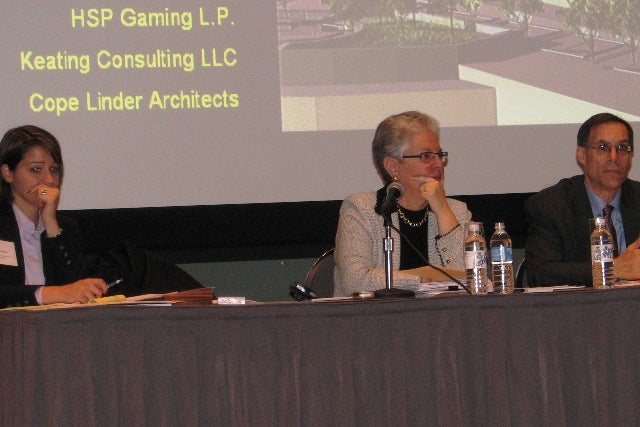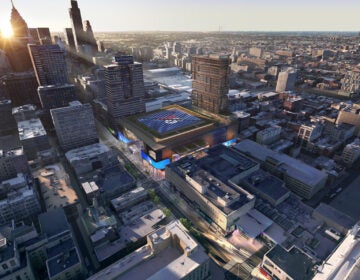City Commerce Dept. rules for SugarHouse

Nov. 27
By Kellie Patrick Gates
For PlanPhilly
Philadelphia Commerce Director Stephanie Naidoff Tuesday gave SugarHouse Casino the right to build on submerged land within the Delaware River’s bed.
“Weighing all factors the project is in the public interest,” Naidoff wrote in her decision. Granting riparian rights “will improve all aspects of the project, and positively will enhance the impact of the development on the Delaware River and on all who use the river for recreation, navigation, fishery and commerce,” she wrote.
The casino and those who want it built savored the decision, while opponents -including Philadelphia City Council, State Rep. Michael O’Brien and State Sen. Vincent Fumo – promised a court appeal.
“We believe we are one step closer to beginning construction and creating new jobs and generating much needed tax revenues for the city and commonwealth,” said SugarHouse Casino President Bob Sheldon in a written statement.
“We’re thoroughly excited. This is fabulous!” said Ed Coryell, executive secretary/treasurer of the Philadelphia Carpenters Union.
“We in the construction industry are dependent on these jobs,” said Pat Gillespie, Business Manager of the Philadelphia Building and Construction Trades Council. “We’re happy that it’s moving forward, and we hope that it gets done sooner rather than later.”
But those opposed to the casino’s planned building site are banking on later. In January, term-limited Mayor John Street – a casino advocate – will be replaced by incoming mayor Michael Nutter. Nutter is very much interested in riverfront development, but has said he would rather see SugarHouse built in another location.
All parties have 30 days to appeal the decision, and State Rep. O’Brien said it would likely be nearly that long before he would file an appeal – he and Rep. William Keller are working on a lawsuit.
O’Brien said he is “hopeful” that Nutter would withdraw the Commerce Department’s decision.
The future mayor would have that right, said City Solicitor Romulo Diaz – but it could cost the city some money.
“It’s going to be whatever the worth of these rights would be to SugarHouse,” he said. “Presumably, I’m assuming in that scenario that SugarHouse would not want to voluntarily relinquish those rights, and so a determination would have to be made” by the courts.
O’Brien said he and Keller are prepared to file a lawsuit on their own or jointly with others, including State Sen. Fumo and Philadelphia City Council.
“I am confident this decision will be overturned in Common Pleas court,” O’Brien said. “And if not, we will litigate the matter in Commonwealth Court, the Pennsylvania Supreme Court, and, because ultimately this becomes a question of the state’s sovereignty, ultimately in the U.S. Supreme Court.”
The appealers contend that only the state legislature – not a city agency – has the authority to grant use of riparian lands.
“The city’s attempt to facilitate SugarHouse’s end run around the state Legislature is not only bad public policy, it is without legal authority. This action will prompt additional costly litigation and is highly unlikely to survive judicial scrutiny,” said Fumo in a written statement.
Brian Abernathy, spokesman for City Councilman Frank DiCicco, said City Council will be filing its own appeal, but will coordinate efforts with others.
Rene Goodwin, spokeswoman for the Philadelphia Neighborhood Alliance, said her organization of neighborhood associations is considering what action it will take.
“One day, there’s a perception of a victory for one side, the next day, for the other side. But one thing holds true through all these scenarios: We’re not giving up.”
The debate over whether the power to grant riparian rights within Philadelphia rests with the city or the state began last month.
Fumo and O’Brien maintain that these rights can be conferred only by an act of the state legislature. By tradition, only a legislator whose district contains the desired land submits the legislation, but both Fumo and O’Brien have pledged not to do that for SugarHouse unless the casino can reach agreements with the neighborhood associations. One association – Fishtown Action – adamantly supports SugarHouse. But many others have united against the casino’s proposed location.
In October, SugarHouse attorneys announced they had found a different route to the rights they say will allow them to build a more attractive casino with more public access to the waterfront: A 1907 law that gives the city Commerce Director the power to grant riparian rights. City Solicitor Diaz agreed with that assessment, and Naidoff convened the hearing on SugarHouse’s request based on his legal counsel.
Fumo argued at the hearing that there were two 1907 laws, similar but with a key difference: Only one gave the city the ability to grant the use of land “into the river”. That statue was overridden by the 1978 Dam Safety and Encroachments Act, which says only the state legislature can grant riparian lands, Fumo said.
The statute that remains on the books not only does not allow the Commerce Department to grant riparian rights, O’Brien said at the hearing, but it applies only to wharves, piers and other elements directly related to water-borne commerce.
Diaz disagrees with this assessment, as do SugarHouse attorneys.
At the Commerce Department hearing, casino opponents said that should Naidoff grant riparian rights to SugarHouse, a deluge of other developers would head for the Commerce Department in search of lower lease fees than the state would charge. In June, the Department of General Services announced a new rate structure: $5 per square foot. The state legislature has not yet approved this rate, and some lawmakers say it’s not enough. But back in June, DGS estimated that SugarHouse would pay roughly $2 million for a 99-year lease.
In her decision, Naidoff said that according to the fee structure in the Philadelphia Code, SugarHouse owes the city $282,270 for the lease.
But this is actually $30,000 more than what the casino would likely end up paying for a state lease, Diaz said.
The Department of General Services awards developers credits for things like community benefits agreements and other costs that benefit the community, Diaz said. These would be subtracted from the $2 million, with a floor of $250,000.
“When you look at what the floor is, which is the amount everyone assumes SugarHouse would have to pay – and compare that to what the city charges, it is a lower fee,” Diaz said. “We don’t have any offsets.”
Kellie Patrick Gates is a former Inquirer reporter. Contact her at kelliespatrick@gmail.com
WHYY is your source for fact-based, in-depth journalism and information. As a nonprofit organization, we rely on financial support from readers like you. Please give today.






